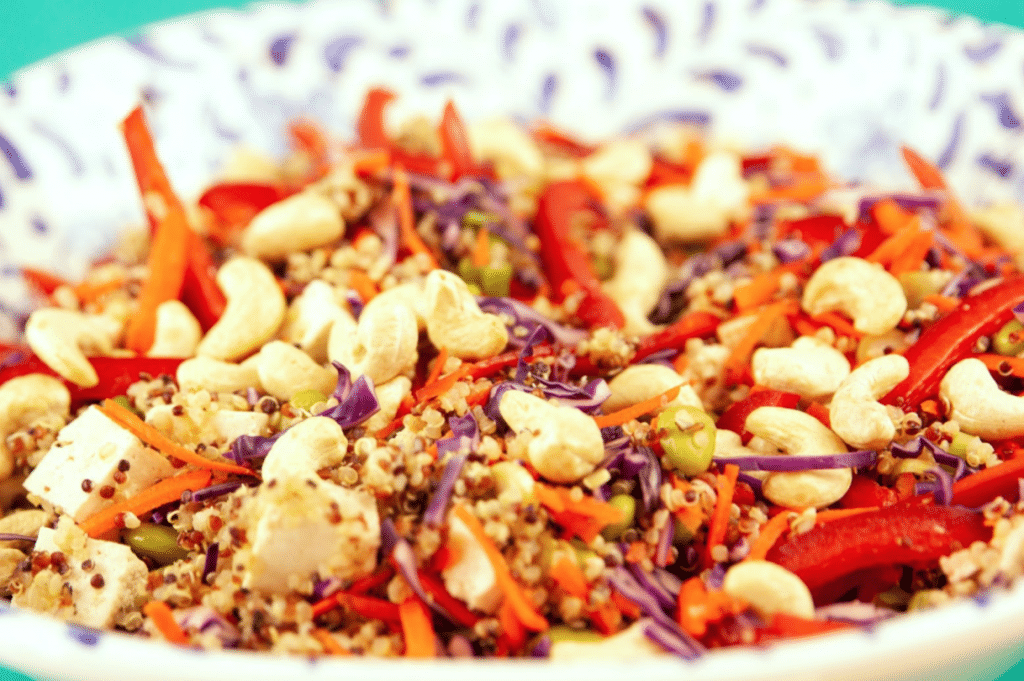
If you’ve made a fast food stop recently, you’ve probably noticed that vegan protein sources are cropping up everywhere. Some of the biggest names in the restaurant industry are offering new items like burgers or nuggets that substitute plant-based protein for the typical red meat or chicken offerings.
Today, more and more people are making the choice to go vegan. Moving away from meat and dairy products can be a positive and healthy decision. But vegan and vegetarian lifestyles can also make finding plant-based protein sources more challenging. Grocery stores and restaurants are providing vegan protein options for those who don’t eat meat or dairy products, but you should be aware of what to look for and what vegan protein sources to stay away from.
Whether you are a brand-new vegan, are considering going vegan, or have been a long-time herbivore, you might be looking to brush up on the best sources of protein for your lifestyle. Read on to learn why vegan protein is critical, some sources to seek out in your diet, and best practices to consider when upping your plant-based protein intake.
The importance of vegan protein
There is one key difference between vegetarian and vegan lifestyles. Vegetarians choose not to include meat as a part of their diet, so it’s permissible for them to eat dairy products, such as milk, yogurt, or butter. People practicing a vegan lifestyle choose not to eat meat, but they also choose not to eat any animal products, which includes dairy, eggs, and honey.
Therefore, vegetarians have dairy products available to them – an entire food group that can be rich in protein, which is unavailable to vegans. This is a key reason why vegan protein sources are so important to ensure vegans maintain a well-rounded and balanced diet.
Protein is one of the three key macronutrients that make up our diets, the other two being fats and carbohydrates. Protein is found throughout the key elements of the body and is essential to human growth and development. It is particularly key for replenishing the energy used by our bodies to complete everything from everyday tasks, to strenuous activities like strength training. When exercise breaks down our muscle fibers, our bodies need protein to repair and rebuild those fibers to make us stronger.
Our bodies can’t manufacture the amino acids that make up protein “in-house” without taking in protein through our diets. Dieticians recommend a daily intake of protein ranging from 0.4-1.0 grams of protein per pound of body weight, depending on both stage of development and level of activity. And for endurance athletes, protein intake is particularly critical during the recovery process after strenuous exercise. This is important to note because protein is not just important for body-builders or strength training recovery, which might seem contrary to the common stereotype of drinking protein shakes after weightlifting, for example.
Meat and dairy products are some of the most protein-rich foods for humans to eat, so vegan protein sources are even more important to ensure that those choosing a vegan lifestyle receive the nutrients their bodies need. Most vegans will need to be intentional to seek out plant-based protein sources, especially when eating outside of the home, where the staples of the commonly served meals are meat or dairy.
Why go vegan
Everyone has their own reasons for choosing a vegan lifestyle; it’s a highly personal and individual choice. Perhaps one of the most well-known reasons to go vegan is morality and ethics. Many people who work with animals or are passionate about the well-being and protection of animals consider eating them to be a wrong choice to make and one that is unkind to the planet.
Similarly, some people who choose a vegan diet do so because of environmental concerns. The meat industry is a high contributor to deforestation, and meat and dairy farms produce high levels of environmental pollution. People who are driven by making positive, sustainable food choices may consider veganism a more responsible decision, by not choosing to participate in the harmful impacts of these industries.
Finally, plenty of people across the world choose a plant-based diet for health-related reasons. Dieticians acknowledge that there can be both positive and negative dietary impacts to a vegan lifestyle. But making a shift toward plant-based protein and away from meat, particularly red meats such as beef, can move the needle toward positive health effects. For instance, the National Institute of Health points to a higher risk of mortality across several health aspects correlated to the consumption of red meat.
It’s important, though, when choosing a vegan diet, to be careful to replace the meat and dairy products with plant-based protein sources rather than moving toward processed or unhealthy “junk foods,” which may seem easy because of the convenience of these foods.
You may know someone who says that they practice a vegetarian or vegan lifestyle, but their diet consists of primarily snack foods or high-sugar content that, though technically “vegan,” do not provide them with the nutrients their body needs. This is why it is so important to know what vegan protein options are available and to work them into your diet, rather than defaulting to the highly processed “junk” options.
Vegan protein sources and recipes to try
Let’s take a look at some vegan protein sources, some of which you might know already, and some that might be new to you!
Beans and Rice
Beans and rice is an important vegan protein staple dish. Beans are a legume and a great plant-based protein source. A half-cup serving of cooked beans provides 6 to 9 grams of protein, as well as a generous serving of fiber to support healthy digestion and a lasting feeling of fullness.
As an added bonus, a cup of rice also provides 4 grams of protein and plenty of carbohydrates. (In fact, other grains, such as quinoa, are also a great source of vegan protein at 5 to 6 grams per serving.) When you put rice and beans together, this meal is considered a “complete protein,” which means it provides all 9 amino acids your body needs – making this well-rounded meal a win.
Recipe to check out: My Darling Vegan Black Beans and Rice
Lentils
Like beans, lentils are a legume, and they come in red, black, green and brown varieties. They are a staple for traditional dishes in cultures across the world, including in Greek soups and Indian curry dishes. With 9 grams of protein in a half cup, it’s no wonder so many countries incorporate lentils into these tasty dishes. Filled with fiber and protein, they’re a healthy and filling part of any meal.
Recipe to check out: Rainbow Plant Life Lentil Bolognese
Seitan
Made from gluten, the primary protein in wheat, seitan can be purchased as a source of plant-based protein or made at home, offering 21 grams of protein in a third of a cup. You can prepare seitan like chicken, make it into strips for sandwiches, or even make a crispy seitan schnitzel. Seitan will keep you full, powering your body and mind as a great soy-free meat substitute.
Recipe to check out: Edgy Veg Vegan Brisket BBQ Style
Nutritional Yeast
Nutritional yeast, as its name suggests, is a deactivated yeast often used in dairy substitutes. It has a unique nutty flavor and is often compared to the taste of dairy products. It can be used as a supplemental protein or an addition to other dishes, by being featured in your next pasta meal or sprinkled on top of snacks like popcorn. Providing 8 grams of protein in a quarter cup, this complete plant-based protein can be found at your local health food store.
Recipe to try: Forks Over Knives Sweet Potato Mac and “Cheese”
Soy Protein Sources
Tofu
Tofu is a commonly known vegan protein source made from soybeans. You might have heard of tofu being used instead of meat in certain recipes, and it’s incredibly versatile – so you can get creative with how you prepare it! Like beans and rice, this soy protein source is also a complete protein and offers 10 grams of protein in a half-cup serving.
Recipe to check out: Rhubarbarians Vegan Tofu Tacos
Tempeh
Like tofu, tempeh is made from soybeans, but tempeh is even higher in soy protein than tofu because it is more compact, packing 15 to 16 grams of plant-based protein in a half-cup serving. Unlike tofu, which takes on the surrounding flavors, tempeh has its own unique nutty flavor. Tempeh can be marinated and baked or stir-fried, then paired with a grain or a vegetable for a fabulous dinner.
Recipe to check out: Eating Bird Food Teriyaki Tempeh and Broccoli
Edamame
You might have mistaken this green soybean for a vegetable before, but edamame is also a vegan-friendly source of soy protein. Offering fiber, plenty of vitamins and numerous health benefits, edamame can be prepared in several ways, such as boiling, steaming, or pan-frying for a tasty snack or side dish.
Recipe to check out: Allrecipes Vegan Edamame
Protein-rich vegetables
When thinking of vegan protein sources, vegetables may not be the first food group that comes to your mind. However, on top of being rich in vitamins and fiber, many veggies are a great source of plant-based protein. Plenty of the leafy greens your mom had you eat growing up, like broccoli, spinach, or asparagus offer 4-5 grams of protein per serving, making them a great addition to the pure vegan protein sources we’ve already discussed. Green peas are also a standout, with 8 grams of protein in a one-cup serving. A medium baked potato provides 4 grams of protein, making it a great side dish or base for other toppings as a main course.
Recipe to check out: Kathy’s Vegan Kitchen Twice Baked Potato and Feasting At Home Broccoli Mushroom Stir Fry
Seeds and nuts
When you’re looking for a tasty, crunchy snack that can also serve as a great vegan protein source, seeds and nuts are a great way to go. Peanuts, almonds and pistachios are perfect for when you’re on the go, giving you 6 to 9 grams of protein in just a quarter-cup. And sunflower seeds or pumpkins are a flavorful addition to any trail mix, with 7 to 8 grams of protein per ounce.
Recipe to check out: Plant Based Cooking High Protein Trail Mix
Keep an eye out for some not-so-great vegan protein sources
Now that we’ve talked through some of the plant-based protein sources to seek out, it’s also important to mention what not to eat. Some companies advertise bars or shakes that are high in protein and do not contain meat or dairy products. Many of these products are advertised as being healthy, but are highly processed or contain unhealthy ingredients.
Non-dairy, high protein shakes may seem like a shortcut to your critical daily intake of vegan protein. But they may have a negative impact on your health if they are highly processed or use ingredients that detract from the health benefits you are otherwise gaining from a vegan lifestyle.
When you see a vegan protein source that has a lengthy list of ingredients or words that you don’t recognize (or can’t pronounce), exercise good judgment when deciding whether to incorporate it into your diet. Look out for high levels of sodium, or artificial-sounding ingredients on the label of the protein sources you pick up. Instead, seek out items that have beans, legumes, or vegetables listed as their first ingredient to ensure that you are taking in pure plant protein.





